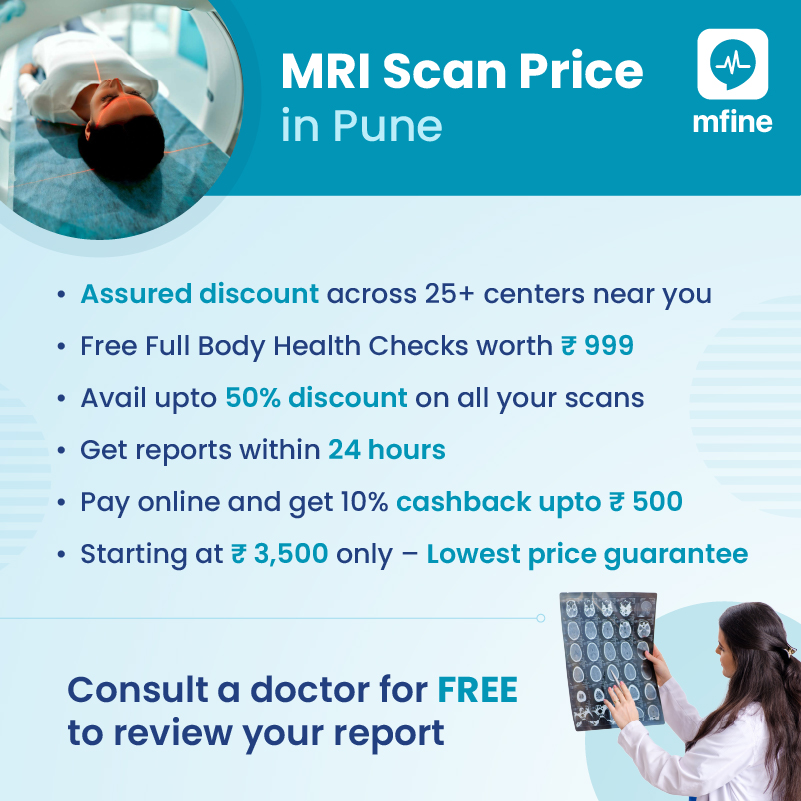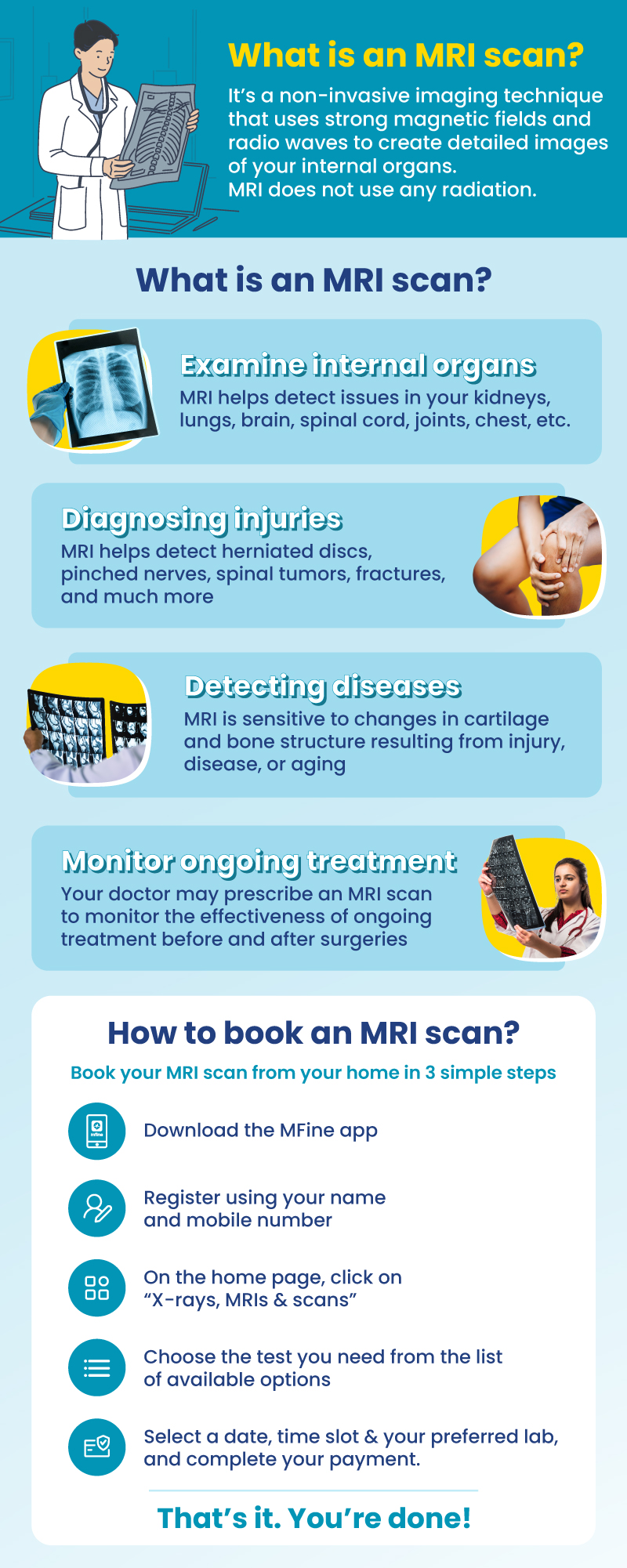
Don’t miss out on this opportunity to get great discounts on Knee MRI scan rates in Pune.
MFine offers you high-quality lab options and an excellent discount of put 50% off on your MRI Knee in Pune.
MRI Scan Knee in Pune by MFine
|
Generally, the market price of an MRI Scan Knee Cost in Pune is above ₹7000 but with us, you can get it for ₹5196 only.
Avail of this exclusive offer by calling us on
Or you can click on the button below for us to call you back.
Make the most of your health investment with our unbeatable offer! Book your Knee MRI in Pune and get a FREE online consultation with a doctor.
Knee MRI scan costs in Pune
Following are the knee MRI scan prices in Pune:
| MRI Knee Cost in Pune | Offer Price |
| MRI Knee Price in Pune | ₹5196 |
| MRI Both Knee Price in Pune | ₹10393 |
For any additional information, don’t hesitate to call us at ☏08061970525. We’re available to assist you in any way we can.
Why should I book MRI through MFine?
|
Exclusive Benefits with MFine
(1) Certified labs
Get access to over 600+ labs certified by NABL and NABH
(2) Same-day slot available
Get scans done on the same day
(3) Quick and convenient
Get reports in 12 hours and digital films in 15 – 20 minutes
(4) FREE Consultation
Post scans, consult a doctor for free to review your report
About Knee MRI Scan
The knee joint is a remarkable part of our body that allows us to walk, run, and move freely. While it may seem simple, the knee is actually quite complex, with many different parts working together. These parts include bones, cartilage, ligaments, tendons, muscles, joint capsule, and bursae.
Sometimes, the knee can get injured or develop problems, and to figure out what’s going on, doctors use a special test called a knee MRI scan. Let’s now take a closer look at how the knee works, why MRI scans are important when they are needed, and what happens during the scan.

Understanding the Components of the Knee Joint
Different components of the knee joint are:
- Bones:
- Femur (Thigh Bone): This big bone in your thigh supports your body weight and helps you move your knee.
- Tibia (Shin Bone): The larger bone in your lower leg, helping you stand and walk.
- Patella (Knee Cap): The small, flat bone in front of your knee that protects the joint and helps with movement.
- Cartilage:
- Meniscus: Two C-shaped cartilage pads that act as cushions in your knee, helping to absorb shocks and keep the joint stable.
- Articular Cartilage: A smooth covering on the ends of bones, allowing them to glide easily and protecting them from rubbing together.
- Ligaments:
- ACL (Anterior Cruciate Ligament): Helps keep your knee stable by preventing the shin bone from moving too far forward.
- PCL (Posterior Cruciate Ligament): Does the opposite job of the ACL, keeping the shin bone from moving too far backward.
- MCL (Medial Collateral Ligament): Keeps the knee from bending too far inward.
- LCL (Lateral Collateral Ligament): Stops the knee from bending too far outward.
- Tendons:
- Quadriceps Tendon: Connects the quadriceps muscles to the patella, allowing you to straighten your leg.
- Patellar Tendon: Connects the patella to the shin bone, helping you jump and run.
- Muscles:
- Quadriceps: These muscles in the front of your thigh help extend your knee and straighten your leg.
- Hamstrings: Muscles at the back of your thigh that help you bend your knee and move your leg backward.
- Gluteal Muscles (Glutes): Located in your buttocks, they provide stability and support for your knee during weight-bearing activities.
- Joint Capsule: A thin, tough covering around your knee joint that helps keep it stable. It contains synovial fluid to keep the joint lubricated.
- Bursae: Fluid-filled sacs that reduce friction between different parts of the knee, making movement smooth and painless.
Why Knee MRI Scans Are Important?
Knee MRI scans are essential because they help doctors see inside your knee without any invasive procedures. Using strong magnets and radio waves, MRI scans create detailed images of the knee’s internal structures. This is important because:
- Accurate Diagnosis: MRI scans provide clear pictures of the knee, helping doctors accurately diagnose injuries and conditions like ligament tears, cartilage problems, and fractures. This leads to better treatment plans.
- Understanding Degenerative Conditions: MRI scans help doctors see changes in your knee joint caused by conditions like osteoarthritis. This allows them to monitor your knee health and provide appropriate care.
- Planning for Surgery: If you need knee surgery, an MRI scan will show the surgeon exactly what’s wrong and help them plan the best way to fix it.
- Tracking Healing: After surgery or during recovery, MRI scans can show how well your knee is healing and if any additional treatment is needed.
When Do You Need a Knee MRI Scan?
Your doctor may order a knee MRI scan for various reasons, including:
- Injuries: If you have hurt your knee in an accident or while playing sports, an MRI can help find out what’s damaged and how bad it is.
- Persistent Knee Pain: If your knee hurts for a long time and other tests don’t show the cause, an MRI can provide more information.
- Chronic Conditions: If you have a long-term knee problem like arthritis, an MRI can show how it’s affecting your joint.
- Pre-Surgery Planning: If you need knee surgery, an MRI will give the surgeon a clear picture of your knee and help them prepare for the procedure.
- Unexplained Symptoms: If you have knee problems that can’t be explained by other tests, an MRI can give more details.
What Happens During a Knee MRI Scan?
A knee MRI scan is a safe and painless procedure that usually takes 30 to 60 minutes. Here’s what to expect:
- Preparation: You may need to change into a hospital gown and remove any metal objects or jewelry.
- Positioning: You will lie down on a table that slides into the MRI machine.
- Stillness: It’s important to stay still during the scan to get clear pictures. The MRI machine may make loud noises, but you’ll be given earplugs or headphones to block the sound.
- Contrast Agent (If Required): In some cases, you may get a special dye through an IV to make certain parts of your knee show up better in the images.
- Comfort: If you feel uncomfortable in the MRI machine, let the technologist know. They can help you feel more at ease.
FAQs
What does an MRI scan of the knee show?
An MRI scan of the knee can reveal detailed images of bones, cartilage, ligaments, tendons, muscles, and other soft tissues, helping to diagnose various conditions and injuries.
How long does an MRI of the knee take?
An MRI of the knee usually takes around 20 to 45 minutes, depending on factors like the facility’s protocols and the specific imaging requirements.
Will MRI show all knee damage?
MRI is highly effective in visualizing many types of knee damage, but some minor or subtle issues might not be as easily detectable.
Can an MRI detect nerve damage in the knee?
Yes, an MRI can provide information about nerve damage in the knee area, helping to identify issues like nerve compression or inflammation.
Is MRI or XRAY better for knee pain?
MRI is generally better for assessing knee pain because it provides more detailed images of soft tissues like ligaments, tendons, and cartilage, while X-rays focus on bones.
Read the complete blog on Which is Better: CT Scan or MRI?
Can MRI show arthritis?
Yes, MRI can show signs of arthritis by revealing changes in joint structures, cartilage, and surrounding tissues, helping to diagnose and monitor the condition.
Does the whole body go in MRI for a knee scan?
No, only the lower half of your body, specifically the leg with the knee being scanned, will be inside the MRI machine for a knee scan.
What position should I do my knee MRI?
Typically, you’ll lie on your back with your knee extended and positioned inside the MRI machine for a knee scan.
What does a knee MRI feel like?
During a knee MRI, you’ll likely feel stillness and hear loud, rhythmic noises as the machine works. It’s painless, but some people might find the confined space and noise unsettling.
What are the side effects of an MRI of the knee?
MRI of the knee generally has no side effects. However, some individuals might experience mild discomfort due to the machine’s noise or feelings of claustrophobia. If contrast dye is used, there can be a slight risk of allergic reaction or other rare complications.
Other topics you may be interested in:
| For further assistance call us on ☏08061970525 |

 Call us:
Call us:


 Call
Now
Call
Now